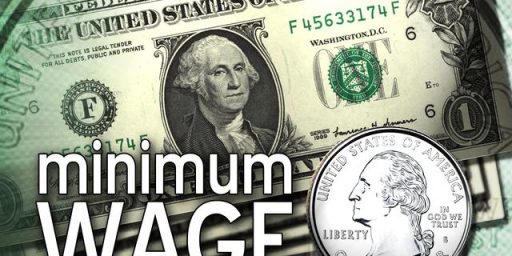Maryland Raises Minimum Wage Over Ehrlich’s Veto
Maryland’s Democrat-controlled legislature raised the state’s minimum wage over the veto of Republican governor Bob Ehrlich.
Maryland lawmakers voted yesterday to raise the state’s minimum wage by $1 an hour, delivering a pay increase to more than 50,000 workers who toil on the bottom rung of the employment ladder.
Nice, objective lede, that.
The Democrat-led Senate voted 30 to 17 to override Gov. Robert L. Ehrlich Jr.’s veto of the legislation, which will in 30 days officially increase the minimum wage in Maryland to $6.15 an hour, $1 more than what is mandated by federal law. The House, also led by Democrats, voted to override Ehrlich (R) last week.
Lawmakers brushed aside concerns from Ehrlich that the move would prompt a small-business revolt and shove low-income laborers out of jobs. Yesterday, he called it “a job killer for the most marginal worker.”
The lawmakers’ action means Maryland will join 17 states and the District in guaranteeing a higher minimum wage than federal law requires. The District’s minimum is $7 an hour. In Virginia, the rate is pegged to the federal rate.
The veto override was the second in the opening days of the 2006 General Assembly session to draw a bolder line between the two parties as they head into a hotly contested election season, a split that follows a traditional storyline for each party. Democrats billed the passage of the wage bill, coupled with legislation approved last week requiring Wal-Mart to spend more on employee health benefits, as a way to plant their party firmly on the side of working-class voters. The governor, by contrast, wants to show his party’s unyielding commitment to the business community. “These two votes have become two more reasons for businesses not to come to Maryland,” said Ron Wineholt, vice president for government affairs for the Maryland Chamber of Commerce, who said the symbolic effect of both bills extends well beyond the people they will directly affect.
My guess is that this is a battle the Democrats win. Giving free money to poor people is a winning political strategy. This is especially true when Republicans don’t argue against a minimum wage, per se, on economic grounds but merely over the hourly rate.
Economically, this is a mixed bag. Ehrlich and the Republicans are certainly right that mandating a 19% pay hike for low skill workers will cause some businesses to relocate, some employees that to be fired/not get hired, and even marginal businesses to go under. On the other hand, many businesses–those in the service economy, most notably–do not enjoy the option of crossing state lines and can pass these increased costs on to their customers. I have no idea whether the pay raises for those workers that are retained will be an aggregate gain or less as compared to those who lose or do not get jobs.
Update: Tim Worstall, writing at TCS, looks at the general issue of “living wage” legislation.
Certainly some who know (e.g. [former Clinton Labor Secretary Robert] Reich) say that while it’s a very inefficient way of helping the working poor (if that’s what the populace, in their delusion, want to happen) then politicians will go along with it in return for votes. It might also be worth noting that the EITC — that more efficient method of providing aid — is, in fact, a form of Milton Friedman’s idea of a negative income tax. Really, who would have thought it? An economist often demonized by the left campaigns for 40 years for a policy that actually helps the poor?
[…]Which policy is being promoted? As this Daily Kos piece shows, the inefficient one that causes more pain — with John Edwards and others in the Democratic Party pushing it across the nation. Yes, really, a group of politicians will push a known-to-be-worse-than-the-alternative policy simply because it will get them votes.
The moral thing to do, of course, would be to explain to activists and voters that yes, helping the working poor is a good idea. However, here is a better way to do it. That better alternatives fail — that the living wage campaign is based upon pandering to the ignorance of the electorate (which amounts to following rather than leading) — is what leads me to believe that Jessica Cutler is not nearly one of the most immoral people in politics. At least she was the passive participant in the screwing rather than the active.
Indeed.
________
Previously: Maryland Orders Wal-Mart to Provide Health Coverage





My guess is that the main effect will be that more illegal immigrants are hired and paid under the table, or that employers keep more workers part-time so they don’t have to pay benefits.
I suspect for the most part this will look nice as far as campaigns go for the dems, but the reality is that it is mostly moot, given that most employers hire new employees above minimum wage as it is.
My husband worked grocery for 5 years while he was in school-most new hires started at about $7 an hour, and in the larger cities in the area, closer to $9.
I suspect the only people who will see a rise in their paychecks will be the teenager working the cash register at McDonald’s.